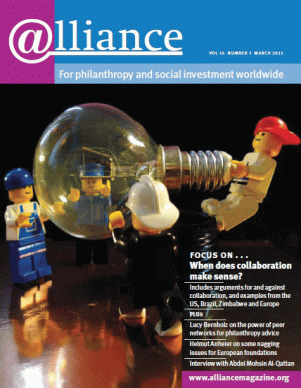‘We’re strongest when funders who share the same goals join forces’
Upholding the constitutional rights of immigrants in a free society helps strengthen similar human rights protection for all American citizens. This is the principle underlying the Four Freedoms Fund (FFF), a national collaborative fund in the US, set up in July 2003 to energize democracy by supporting and engaging immigrants and refugees. It aims to build an infrastructure in the US that links immigrant rights groups on a local, state and national level on issues of immigration reform, civic engagement, immigrant integration and protection of civil liberties and human rights.
Since it began, FFF, which is hosted by Public Interest Projects, has invested over $23 million in 85 grantees nationally. Grants are made in geographic areas with sizable and/or growing immigrant populations. The fund also offers support to grantees by hosting meetings and providing technical assistance. Based on the needs of the immigrant rights field, FFF has incorporated three specialized initiatives into its work: strategic communications, civic participation and capacity building.
Current funders include the Carnegie Corporation of New York, Ford Foundation, Evelyn and Walter Haas, Jr Fund, Open Society Institute, Horace Hagedorn Foundation, Bill & Melinda Gates Foundation, J M Kaplan Fund, Northwest Area Foundation and Western Union Foundation. FFF also works closely with the John S and James L Knight Foundation, which created the American Dream Fund as a sister fund to promote immigrant integration in 26 local communities.
Last year, the work of FFF was recognized when its co-founders, Taryn Higashi, executive director of Unbound Philanthropy, and Geri Mannion, director of the US Democracy Program at Carnegie Corporation, were named co-recipients of the Council on Foundations’ Robert W Scrivner Award for Creative Grantmaking.
‘We’re strongest when funders who share the same goals join forces,’ believes Higashi. ‘Using this approach,’ says Mannion, ‘we were able to aggregate funds from both our own foundations as well as from our funder colleagues. In addition to increasing the funds available to the immigrant integration field, we ourselves became better and more strategic grantmakers. Instead of looking through only my Carnegie lens we could also see through the Ford lens and learn from other grantmaker perspectives that were regional, local and international. We have also been able to work collaboratively with grantmakers who weren’t able to contribute to the fund directly but were funding similar efforts at the local and/or state level.’
For more information
http://www.fourfreedomsfund.org/projects/partner-and-collaborative-funds/fff





Comments (0)